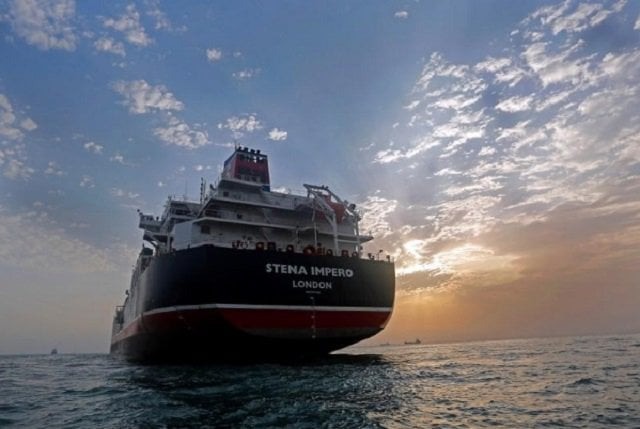US issues warrant for seizure of Iranian tanker in Gibraltar
Says vessel & oil aboard are subject to forfeiture based on violations of International Emergency Economic Powers Act

Iran had previously seized a British tanker in the Strait of Hormuz for alleged marine violations and allowed a second one to proceed after issuing a warning.
PHOTO: REUTERS
The Justice Department alleged the ship was part of a scheme "to unlawfully access the US financial system to support illicit shipments to Syria from Iran by the Islamic Revolutionary Guard Corps," which the US has designated a foreign terrorist organization.
The warrant says the vessel, which remained anchored in the British Mediterranean territory late Friday, and all the oil aboard are subject to forfeiture based on violations of the International Emergency Economic Powers Act, as well as bank fraud, money laundering, and terrorism statutes.
China-owned oil tanker changes name in apparent effort to evade US sanctions
It also ordered the seizure of $995,000 in an account at an unnamed US bank associated with Paradise Global Trading LLC, which it called a shell company associated with businesses which act for the Revolutionary Guards.
There was no immediate word from Britain or Gibraltar over whether they would act on the warrant, as Iran said it was sending a new crew to pilot the tanker and its 2.1 million barrels of oil.
On Thursday a Gibraltar judge ordered the release of the Grace 1, six weeks after it was detained on suspicion of violating international sanctions on Syria, the alleged planned recipient of the crude oil it was carrying.
The judge rejected a last-minute legal move by Washington demanding that the ship remain detained.
Iran tanker prepares to leave after Gibraltar decides to free it: TV
The July 4 seizure came amid surging tensions in the Gulf after several alleged Iranian attacks on smaller tankers.
The US - citing Tehran's threat to American allies - expanded its military presence in the region with a new aircraft carrier task force, missile batteries and strategic bombers.
Iran called the detention of the Grace 1 an "illegal interception" staged by the United States, while Washington cheered it as "excellent news."
Tehran and Washington have been at loggerheads since US President Donald Trump withdrew last year from a landmark 2015 nuclear deal between major powers and Iran, reimposing crippling unilateral sanctions.
In the wake of Grace 1's detention, on July 19 Iran seized the British-flagged tanker Stena Impero in the Strait of Hormuz.
Tehran said the ship was in violation of "international maritime rules," but the move was widely seen as retaliation for the Grace 1.
Thursday's release of the Grace 1 came after Gibraltar's government said it had received written assurances from Iran that the ship would not be headed for countries "subject to European Union sanctions."
"We have deprived the Assad regime in Syria of more than $140 million worth of crude oil," Gibraltar chief minister Fabian Picardo said.
The US-issued seizure warrant would require Britain to decide whether to act again to detain the vessel, and it was not clear if that would happen.
Iran seizes foreign oil tanker in Gulf, seven sailors detained
Earlier Friday, Iranian officials said the tanker was preparing to set sail under an Iranian flag and would be renamed the Adrian Darya for the voyage.
Iranian Foreign Minister Mohammad Javad Zarif tweeted that the US attempt at "piracy" had failed, saying it showed Washington's "contempt for the law."
But according to an AFP source, the ship was awaiting the arrival of a new Iranian crew before it would leave Gibraltar. The original captain and crew were Indian nationals.
On Thursday the US State Department threated to issue a visa ban on anyone working on the ship.
Iran denied Friday it had made any promises about the ship's destination to secure the release, saying Gibraltar was only seeking to "save face."
"Iran has given no assurances over the Grace 1 not going to Syria to secure its release," a state media website quoted foreign ministry spokesman Abbas Mousavi as saying.
"The tanker's destination was not Syria... and even if it was, it did not concern anyone else."



















COMMENTS
Comments are moderated and generally will be posted if they are on-topic and not abusive.
For more information, please see our Comments FAQ